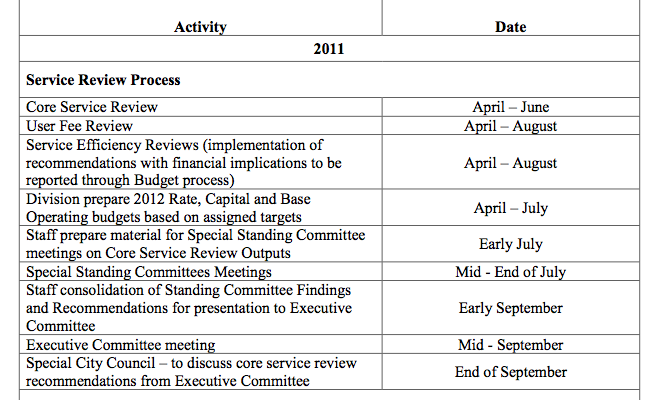We’re nearly two weeks into the slow roll-out of the KPMG-produced Core Service Review reports. All in all, it’s been a process both maddening and mundane. Each report contains something that very clearly should be considered pretty damn sacred — Heritage Grants, Community Investment Programs, childcare spaces, libraries — but, at the same time, neither the mayor nor council has actually endorsed any of these prospective cuts, so getting all worked up about loss of service seems premature. Nothing’s been recommended yet.
Let’s repeat that last bit: nothing has been recommended yet.
For real, despite some media outlets who have continued to report that the KPMG reports lay out a series of recommendations that will save the city cash off its bottom line, what they actually do is far less sexy. The consultants make no recommendations, no suggestions, point out no defined ‘waste’ or specific opportunities for significant efficiencies. Instead, all they do is list and categorize city services, identifying those that are mandatory (ie. bound to exist through provincial/federal legislation), those that are essential (ie. those that without which the city would catch on fire or sink into the lake) and those that are traditional (ie. those that are commonly-accepted municipal responsibilities). The consultants also “grade” the quality of service provided by each function, and identify places where service could be scaled back to be more in line with comparable cities across the globe.
That’s it and that’s all. Â The introduction to the reports lays it out pretty clearly. Here’s what they say they’re going to do: “review and analyze all City of Toronto services, activities and service levels provided by divisions and agencies and to apply a core service filter to assist Council’s decision-making. The filter identifies services that are not core, or that are provided at higher than standard service levels.”
Even more telling is what they say  they say they aren’t going to do:  there will be no “detailed analysis of services to identify efficiency and effectiveness opportunities.” Also no “detailed articulation of cost savings potential to be achieved through service changes.” And, lastly, they’re not going to make “management decisions on what actions to pursue with respect to City services.” Or, in other words, this is just a list of items filtered through a framework. These are not recommendations.
And that only makes sense, because they don’t read like recommendations. Why else would things like the Toronto Atmospheric Fund, City-owned parking lots or the Pet Licensing program appear on the list? These programs have a good track record of actually generating revenues for the city. Yes, they’re activities that go beyond the “core” services the City of Toronto should provide, but they’re relative success stories — there’s no business case to recommend cutting them.
The mayor may not understand this
The Toronto Sun really doesn’t seem to grasp this. They’ve used the words “recommend” or “recommended” across most of their stories relating this process. But that’s forgivable: long-winded explanations like the one above don’t just take up valuable column space, they also bore the hell out of people.
More troubling are comments from Mayor Rob Ford, who told the Toronto Sun on Wednesday that, “The report shows there are millions of dollars to be saved by getting rid of waste and duplication.” Well, not really. The report mostly shows that there’s some money to be saved if the City stops doing some of the things it has been doing.
Real efficiency — the kind that doesn’t result in massive service cuts — requires a long-term, measured approach. The KPMG report does vaguely point to some potential avenues that might result in real efficiencies: things like combining HR functions, contracting out cleaning services or outsourcing printing and design work. But those kinds of rejiggerings-of-bureaucracy are slow-movers. They’re not going to provide the same kind of immediate budget-saving impact as would, for example, selling Exhibition Place, shutting down all-night bus service or immediately eliminating all funding for community events like Pride or Caribana.
No focus on improving customer service
One of the things that so endeared then-Councillor Rob Ford to his constituents was his focus on customer service. He was known for visiting residents with city staff in tow, making sure that complaints were dealt with in a timely manner. It’s one of those things that marks the Mayor — despite the political rhetoric and divisiveness — as an ultimately decent and compassionate guy.
That’s why it’s so sad that this Core Service Review process has essentially turned its back on the notion of improving customer service for residents. In fact, it’s been outright hostile to customer service, identifying places where the city ranks too highly and placing them into consideration for potential cutbacks. KPMG’s report introduction states outright that “Services that appeared to have elevated service levels were considered for opportunities for service level reductions, alternate service delivery, or reengineering.”
A few months into this council term, Ford described customer service as his “number one priority.” That priority seems to have been lost in this process.
